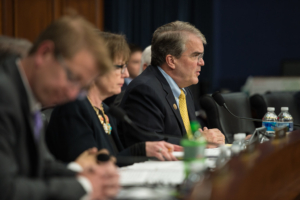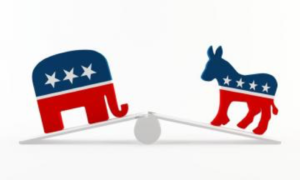Breaking Up Is Hard To Do
Here’s What You Need To Know
As the Biden Administration adds a “global minimum corporate tax rate of 15 percent” or higher to its plans to raise taxes and increase regulations, the business community should be able to turn to its traditional allies among Republicans to fight back. However, while Biden is unlikely to win Republican votes for higher taxes, in today’s political environment, the GOP may not mount the full-throated defense upon which the corporate community has depended in the past.
As Senator Rick Scott (R-FL), who chairs Senate Republicans’ campaign committee, warned companies last month, “There is a massive backlash coming. You will rue the day when … Republicans will take back the Senate and the House.” Indeed, Scott’s “day of reckoning” may not wait until the 118th Congress. Already, companies must contend with Senator Marco Rubio’s (R-FL) “Common Good Capitalism,” Senator Josh Hawley’s (R-MO) anti-trust initiatives, and other populist shifts among Republicans on core business policy interests like trade and tariffs and drug prices.
So, how did we get here, and what does it mean for companies and their business and policy objectives? Here’s what public affairs professionals need to know to help their organizations navigate this political realignment.
Subscribe to Receive Insights
"*" indicates required fields
Under Pressure From Progressives in and Out of Their Firms, Companies Have Gone Too “Woke” for Republicans
“For decades,” The New York Times recently reported, “business leaders have been able to count on Republicans … to support core policy priorities such as low taxes, reduced regulation and free trade. … But in recent years, that compact has begun to fracture.” Pressure from social activists and activism-oriented employees has led businesses that once avoided the political fray to take controversial stands on matters far beyond their typical purview, alienating conservative Americans and drawing ire from the lawmakers who represent them. For companies, the principles in question seem straightforward – every vote should count, the lives of African Americans matter, and so on – but behind these shared principles are expectations that firms will endorse divisive, partisan solutions as a result.
Every acquiescence, even if made in earnest agreement, may at least temporarily redirect activists’ attention elsewhere, but it also sparks objections from conservatives. These days, Republican lawmakers feel antagonized by what they view as “Big Business” needlessly provoking their voters by engaging on social issues. From Nike pulling its Betsy Ross shoes at the behest of NFL-star-turned-social-activist Colin Kaepernick to social media companies “de-platforming” former President Donald Trump to an open letter from major corporations opposing Republican-led election reform laws, Republicans increasingly see Corporate America as fundamentally at odds with the GOP. Nor does it help that as corporations cut off donations to many Republicans, key business groups get little help from Democrats they backed in the last election.
From Tarp to Trump, the GOP Base Has Been Increasingly Questioning Its Elected Officials’ Accommodation of Corporations With Divided Loyalties
For generations, Republican lawmakers have been reliable partners for business interests as together, they advanced the ideals of limited government, lower taxes and regulatory restraint. These had long been core tenets of conservatism, and these policies served the business community well. However, the taxpayer-funded bailouts of “Big Business” during the 2008 financial crisis led an increasing number of conservatives to question whether or not the interests of Corporate America aligned with their own. This skepticism built on years of automation and outsourcing erasing certain types of American jobs.
These trends have led to an intensifying flirtation with populism, an ideology that up until recently had gained more traction among Democrats than Republicans. While industry analysts may have hoped populism would be on its way out with the Trump Administration, eager GOP would-be successors are lining up for their turn at the anti-corporate bully pulpit. Some, such as Sen. Rubio, argue for a policy approach that “recognizes that what the market determines is most efficient may not be best for America.” These would-be successors’ proposals include protectionist measures intended to help American workers but that could make it more difficult for U.S. companies trying to compete globally, such as trade barriers like Buy American and tariffs, industrial policy for strategic industries, and greater antitrust measures. Such proposals are becoming more accepted among GOP voters, especially “traditional conservatives” nostalgic for Main Street America of yesteryear and increasingly skeptical of large corporations.
This Ongoing Realignment Puts Companies’ Business and Policy Objectives at Serious Risk Across the Political Spectrum
In 2021, Americans seem to find little room for agreement in politics, but they do share concern over the sweeping influence of “Big Business.” For politicians in both parties, this angst is all the permission they need to push for radical transformations in economic policy. In addition to the shifts on trade and tariffs seen under the Trump Administration, this realignment even has some conservatives musing about the virtues of private sector unions, especially when they’re pitted against activism-minded executives at companies like Amazon.
The most noticed shift in policy, however, may be Republican interest in antitrust measures once a tool generally preferred by Democratic lawmakers who oppose big corporate profits. In addition to toying with the idea of using anti-trust rules against Major League Baseball following their decision to relocate the 2021 All Star Game after Georgia passed new election reforms, some prominent Republicans, including Sen. Hawley, are joining with Democrats eager to break up Big Tech. This major philosophical shift for Republicans could create greater obstacles to mergers and acquisitions, an important consideration as the Biden Administration nominates – and a bipartisan panel supports – antitrust crusader Lina Khan, to serve as a commissioner of the Federal Trade Commission (FTC). While she has previously focused her aim on Big Tech, her activist résumé is ringing the alarm bells across all industries.
From taxes and tariffs to tech and trust, the ground is shifting in Washington for public affairs professionals representing companies and industries, which now face greater headwinds from both political directions in Washington. At the very least, it means that the business community can no longer rely upon a unified GOP to stand strong for their interests in all cases. At worst, it means that Democrats and Republicans could find some room for bipartisan agreement at the expense of “Big Business.” Either way, companies will need to dig deeper to understand the new landscape.



